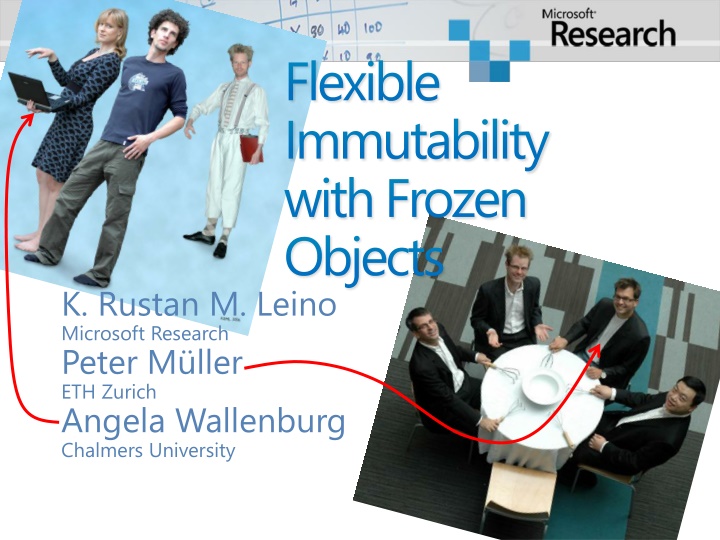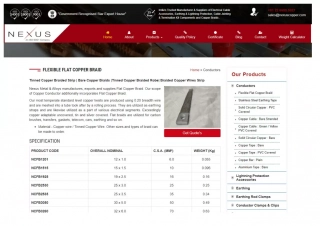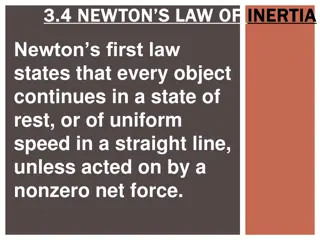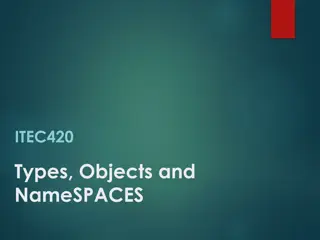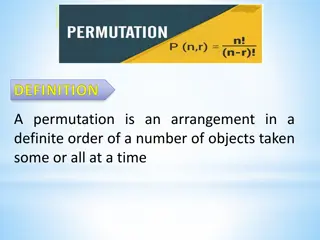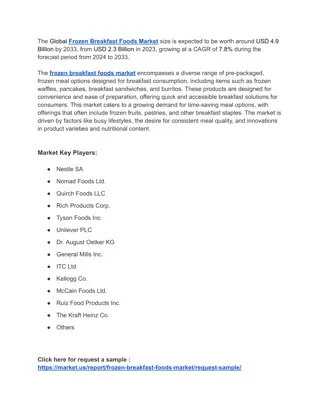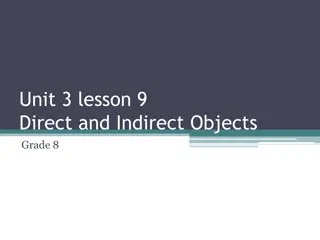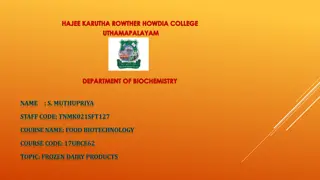Flexible Immutability with Frozen Objects
Verification system for object-oriented programs introducing a structuring technique for objects that no longer undergo change. Explore object invariants, Boogie methodology, ownership concepts, and object states in the context of immutable objects. Learn about invariants over multiple objects and different classes in a demonstration setting. Dive into the significance of object consistency and validity within the realm of immutability.
Download Presentation

Please find below an Image/Link to download the presentation.
The content on the website is provided AS IS for your information and personal use only. It may not be sold, licensed, or shared on other websites without obtaining consent from the author.If you encounter any issues during the download, it is possible that the publisher has removed the file from their server.
You are allowed to download the files provided on this website for personal or commercial use, subject to the condition that they are used lawfully. All files are the property of their respective owners.
The content on the website is provided AS IS for your information and personal use only. It may not be sold, licensed, or shared on other websites without obtaining consent from the author.
E N D
Presentation Transcript
Flexible Immutability with Frozen Objects K. Rustan M. Leino Microsoft Research Peter M ller ETH Zurich Angela Wallenburg Chalmers University
Executive summary Context Verification system for object-oriented programs Contribution Specification and structuring technique for objects that no longer undergo change
Object Invariants class C { int x, y, z; invariant x < 0 y z; } Boogie methodology (used in Spec#) Spec# demo: shows/ads
Invariants over multiple objects class C { T t; invariant t.x = 10; } class D { T s; invariant s.x = 23; } :C t :D s :T Spec# demo: guitar/level
Ownership class C { rep T t; invariant t.x = 10; } class D { rep T s; invariant s.x = 23; } :C t owner :D s :T Spec# demo: rep :T
Object states An object is valid if it is not exposed ( o o.owner.valid An object is consistent if it is valid and its owner is not valid o.valid) :Rock Band Spec# demo: strum :Guitar :GtString :GtString
Classes of immutable objects Spec# demo: roadie/immutable
Classes of immutable objects Spec# demo: roadie/immutable Example summary: Cannot share a rep object Base class of immutable class cannot be mutable Cannot apply mutable methods on an immutable object
Frozen objects Indicate which instances, not just whole classes, are immutable Indicate when an object becomes immutable Frozen objects can be mentioned in invariants freeze operation transfers ownership to an fictitious freezer object
Using frozen in RockBand class RockBand { frozen Roadie rd; invariant rd.Strength = 5; RockBand() { Roadie r = new Roadie(5); r.SchlepInstruments(); r.PrepareStage(); freeze r; rd = r; } }
RockBand picture freezer :RockBand rd gt owner :Guitar :Roadie
Immutable classes revisited Special case of frozen objects Frozen objects give good encoding of immutable classes
Alternative design Partial ownership Chalice demo: RockBand
Chalice demo: RockBand class RockBand { var r: Roadie invariant rd(r) && r != null invariant acc(r.strength) && r.strength == 5 method Main() { var arnold := new Roadie arnold.strength := 5 var abba := new RockBand abba.r := arnold share abba var noDoubt := new RockBand noDoubt.r := arnold share noDoubt } } class Roadie { var strength: int }
Conclusion Frozen objects are flexible. A program can: decide which instances are frozen decide when each instance becomes frozen Frozen objects can fit into any system with ownership and ownership transfer Frozen objects can encode immutable types Invariants can be written over frozen objects Future: implement in Spec# http://research.microsoft.com/specsharp
